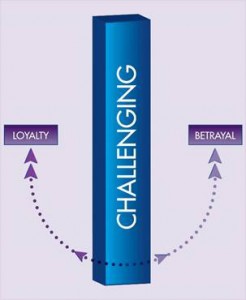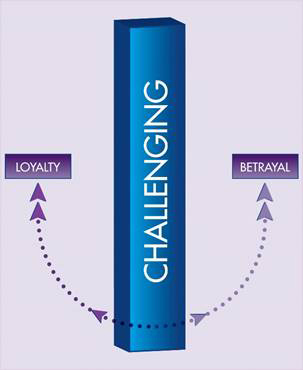More on calling out bad behaviour in the workplace…
I find it fascinating to hear the reticence people have to calling out bad behaviour in front of others when the person exhibiting the bad behaviour chose to do so in front of these  same “others”. People seem to believe the conversation where the bad behaviour is called out needs to be had in “private”. This is at the heart of the issue and unfortunately impacts seriously on the culture of the team and the organisation. By taking the conversation with the person who exhibited the bad behaviour “off line” so we are not perceived as “betraying” the person in front of others we are risking a number of things:
same “others”. People seem to believe the conversation where the bad behaviour is called out needs to be had in “private”. This is at the heart of the issue and unfortunately impacts seriously on the culture of the team and the organisation. By taking the conversation with the person who exhibited the bad behaviour “off line” so we are not perceived as “betraying” the person in front of others we are risking a number of things:
1. The person exhibiting the bad behaviour has no recollection of what you are talking about and may tend to “deny” it (because you have not caught them in the moment)
2. Tolerating the behaviour in front of others shows to them this kind of behaviour is acceptable
3. Loss of respect for you as the manager/leader/more senior person in the group because you are showing a lack of respect for yourself by making it OK for the person to behave in this way
4. Continued swings between loyalty and betrayal so people never really see how to challenge and be challenged constructively and with respect
5. Fear of being exposed to this kind of behaviour in the future so it may stop some people from sharing their thoughts and ideas in the future.
This is just to name a few “top of mind” things that you risk because you don’t want to call out the bad behaviour of someone for fear of upsetting them. In my opinion a significant cost is borne by too many people for it to be considered a reasonable option.
Remember as I said in an earlier BLOG – feel confident that this kind of conversation constitutes “reasonable managerial action” to ensure everyone in the team and the organisation can perform to the best of their ability without being subjected to bad behaviour; so there is no need to fear being called a “bully”. I always say ‘misbehave in public and bear the consequences in public’; remember they chose to do the misbehaving in public so why give them the courtesy of challenging it in private – who are you really protecting and why? Hold that mirror up, take a good look and ask the question to find the “real” answer.
Courageous Leaders call the behaviour from a place of kindness and curiosity to determine the intent behind the behaviour and enCOURAGE the other person to appreciate the impact their choice in behaviour had on you and on others in the meeting/conversation. Think of it as a gift and it entices you to engage more readily in the conversation. People are going to talk about the behaviour anyway – they all witnessed it and saw it tolerated – rather have the conversations out in the open, deal with it and move on openly and constructively.









